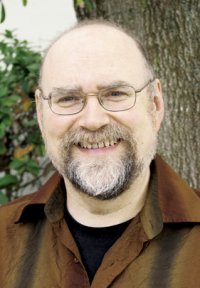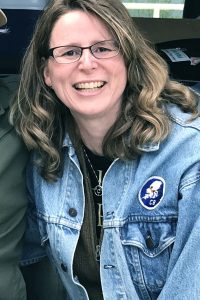Robert Charles Wilson: The Cosmic and the Intimate

Robert Charles Wilson was born in Whittier California and has lived in Canada since he was nine. He sold stories to Analog in 1974, then to Asimov’s and F&SF in 1985. His first novel, alternate world A Hidden Place, followed in 1986, and was a Philip K. Dick Award finalist. His other novels are Memory Wire (1987), Gypsies (1989), The Divide (1990), A Bridge of Years (1991), Philip K. Dick Award Winner Mysterium (1994), Aurora Award winner and Hugo finalist Darwinia (1998), Bios (1999), Hugo nominee and John W. Campbell Memorial Award winner The Chronoliths (2001), Blind Lake (2003), Hugo Award winner Spin (2005) and sequel Axis (2007), a Campbell Memorial Award finalist. Just published, Julian Comstock: A Story of 22nd Century America is an expansion of his Sturgeon and Hugo Award-nominated novella Julian: A Christmas Story (2006).
Wilson’s notable short fiction includes “The Perseids” (1995), a World Fantasy and Nebula Award finalist and an Aurora Award winner; World Fantasy nominee “The Inner Inner City” (1997), Hugo finalist “Divided by Infinity” (1998), Aurora finalist “Plato’s Mirror” (1999), and Sturgeon Award winner “The Cartesian Theater” (2007). Collection The Perseids and Other Stories (2000) was nominated for a World Fantasy Award. He co-edited Tesseracts Ten with Edo van Belkom (2006).
Excerpts from the interview:
“Maybe I don’t see the boundary between science fiction and mainstream as distinctly as some people do. I’ve read science fiction all my life and loved it, but it’s never been something I read exclusively. To me these things are continuous. We’re not just talking about ideas in science fiction; we’re talking about ideas as a facet of human experience — ideas as they’re lived, rather than in the abstract. And if you’re writing that way, then necessarily you have to keep popping back and forth on the scale from the cosmic to the intimate.
“I always loved science fiction that gave you an intimate view of the apocalypse. We say that science fiction asks the question, ‘What if?’ But I think what we’re really asking is, ‘What would it be like if? What would it mean to you or me if?’ That’s a literary question, and I hope I’m appealing to readers like myself, who don’t see a discontinuity between science fiction and literature in general.”
*
“There are three pillars to my latest novel Julian Comstock, three things that coincided for me. One was reading 19th-century popular literature. The second was the story of the Roman Emperor Julian the Apostate, which I first came across years ago in the Gore Vidal novel Julian and came across again in a history of monotheism that dealt extensively with it — that fascinated me. And the third pillar was obviously all the cultural-collapse stuff. There’s a book by James Howard Kunstler, The Long Emergency, that talks about the unsustainability of the kind of civilization we have and posits a return to 19th-century technology levels as a best-case outcome for the 21st century.
“All those ideas converged on me, and I thought, ‘Wouldn’t it be fun to write the story of Julian the Apostate in this post-collapse America and do it in the voice of a 19th-century children’s novel?’ It was hard to pitch that idea to anyone! But in my head it all made sense and I thought, ‘What the hell, I will write this book.’
“For me, part of the process of writing science fiction is continually asking yourself why you’re doing it. Because I grew up loving science fiction, there’s a tendency to accept it as a given — that I love it because it is what it is. But as a writer you have to go beyond that and ask, ‘What is it about science fiction that appeals to me so much? Why am I so obsessed with it?’ If you can identify that core fascination, you can give it back to a reader in a single powerful dose. You’re not just adopting tropes and images at random because you happen to like them or think they’re cool. So that’s what I’ve been trying to do in the course of my career: to get closer and closer to the thing about science fiction that electrifies me, the thing that drew me go to that shelf when I was ten years old at the library.”
*
“People have a set of default futures in their heads now, which is odd. Back in the ’80s, a group of college students was asked, ‘How do you see the world in 40 years?’, and the answers were really pessimistic — they tended toward nuclear wastelands patrolled by killer robots, that sort of thing. Then they were asked, ‘Where do you see yourself in 40 years?’ and the answers tended toward ‘Well, I’ll be ready for retirement.’ So there’s a cognitive disconnect, but I think it’s because our culture is now pervaded with these default notions of the future derived from science fiction.
“Sometimes I think the purpose of modern science fiction should be to challenge those notions, not to further indulge them. One of the things I wanted to do in Julian Comstock was to write a post-apocalypse novel that (a) wasn’t about survival and (b) was a kind of dystopia that wasn’t just an Evil Empire run by the worst human beings — a dystopia more like European monarchies or aristocratic institutions, where there are cracks in the wall; an oppressive set of governmental bodies, but at the same time a lively popular culture. In other words, I wanted something with contradictions built into it. I was tired of dystopias that were triumphant Evil and oppressed Good. Real life isn’t like that.”
*
“I don’t think there’s anything intrinsically elitist about what we do as science fiction writers. It can be hard to address scientific or cosmological questions in a way that speaks to people who aren’t immersed in science fiction or in the sciences . But that’s a problem every writer has: who are you talking to? Who’s your audience? The nice thing about the science fiction genre is we have an expansive space in which all these things can coexist.
“And it was science fiction that introduced me to other, arguably more sophisticated kinds of writing. As a kid coming to science fiction with a perfectly naive interest in spaceships and robots, I was introduced through science fiction to all the broader possibilities of language and literature.
“The quality of writing in science fiction now is higher than it’s ever been. The danger is that we sometimes get seduced into a kind of self-loathing, where we will write a book of science fiction that minimizes the science-fictional element because it might not be acceptable to a broader audience. My response would be,’ ‘No, don’t let go of that! Write a better book, a more profound book, a more interesting book, but don’t cut out the heart of it.’
“Science fiction can talk about scientific and cosmological issues in a way science itself would never permit you to do. I certainly don’t consider myself to be somebody who’s dispensing wisdom, but if I can provoke people into thinking about these big issues on a personal level, I’m satisfied.”
This interview and more like it in the June 2009 issue of Locus.
 While you are here, please take a moment to support Locus with a one-time or recurring donation. We rely on reader donations to keep the magazine and site going, and would like to keep the site paywall free, but WE NEED YOUR FINANCIAL SUPPORT to continue quality coverage of the science fiction and fantasy field.
While you are here, please take a moment to support Locus with a one-time or recurring donation. We rely on reader donations to keep the magazine and site going, and would like to keep the site paywall free, but WE NEED YOUR FINANCIAL SUPPORT to continue quality coverage of the science fiction and fantasy field.





